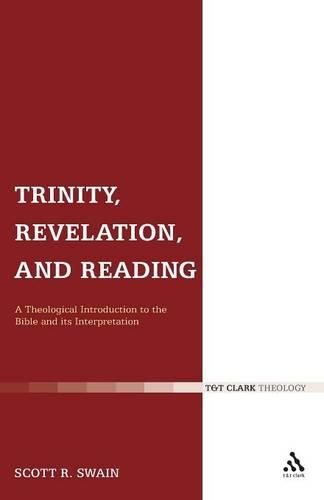
Trinity, Revelation, and Reading: A Theological Introduction to the Bible and its Interpretation
(Paperback)
Available Formats
Publishing Details
Trinity, Revelation, and Reading: A Theological Introduction to the Bible and its Interpretation
By (Author) Dr Scott R. Swain
Bloomsbury Publishing PLC
T.& T.Clark Ltd
15th September 2011
United Kingdom
Classifications
Professional and Scholarly
Non Fiction
Theology
Criticism and exegesis of sacred texts
Calvinist, Reformed and Presbyterian Churches
220.6
Physical Properties
Paperback
168
Width 138mm, Height 216mm
224g
Description
Trinity, Revelation, and Reading (TRR) is a theological introduction to the Bible and biblical interpretation. The overarching thesis is that neither the Bible nor biblical hermeneutics can be understood or practiced properly apart from an appreciation of their relationship to the triune God and his gracious economy of redemption. Scott Swain treats the role of the Word in the saving economy of the triune God, the role and status of Scripture as the Word of God, the nature of biblical reading as a covenantal enterprise, as well as a host of other related topics. These topics are addressed by way of a constructive appropriation, or ressourcement, of many of the themes of patristic theology and early Protestant divinity (esp. Reformed Orthodoxy), while building upon the work of important contemporary theologians as well (e.g., Karl Barth, John Webster, Kevin Vanhoozer). The ultimate goal of this study is that readers will appreciate better the ways in which biblical interpretation is an aspect of their covenantal engagement with the triune God.
Reviews
Clear and persuasive in argument, deeply read in classical and modern divinity, doctrinally and spiritually astute, this is a splendid theological presentation of the nature and interpretation of Scripture. -- John Webster, King's College, University of Aberdeen, UK
Simultaneously traditional and creative, this impressive volume offers a welcome introduction to Reformed dogmatics. -- Matthew Levering, Professor of Theology, University of Dayton, OH, USA
Trinity, Revelation, and Reading becomes in Swain's hands a three-stranded cord for the theological interpretation of Scripture that is not easily bettered. Swain derives his key interpretive categories from the Bible's own storyline. He also locates biblical interpretation, and Scripture itself, in the triune economy of covenantal communication for the sake of communion, thereby putting feet on the idea that Scripture is its own best interpreter. This is a fresh yet sound and richly satisfying account of why and how the church is to think about and read the Bible "as what it really is, the word of God" (1 Thess. 2:13). -- Kevin J. Vanhoozer, Blanchard Professor of Theology, Wheaton College and Graduate School, IL, USA
Summarized. * New Testament Abstracts *
Directly informed and bibliographically rich -- Christoph Bultmann * Theologische Literaturzeitung, vol 139 (Bloomsbury translation) *
Author Bio
Scott R. Swain is Associate Professor of Systematic Theology, Reformed Theological Seminary, FL, USA.
